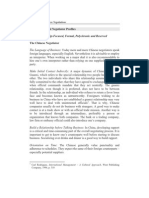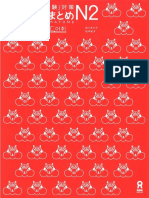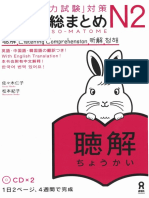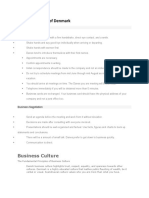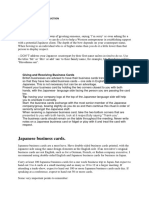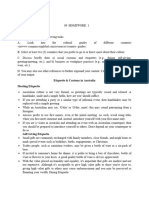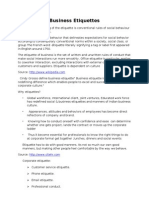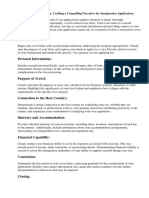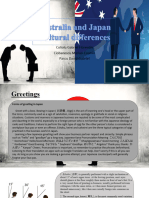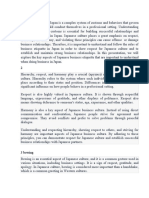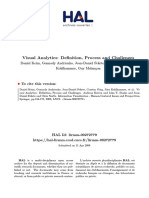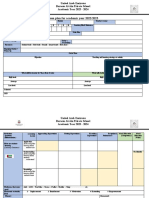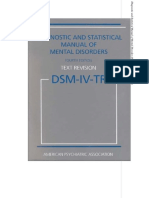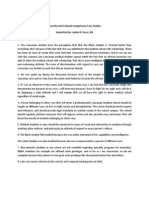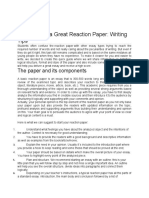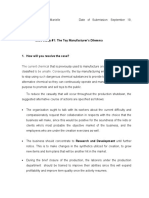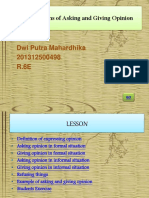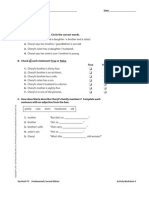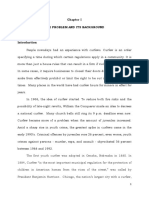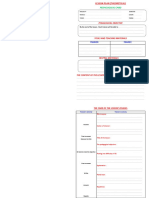Professional Documents
Culture Documents
Business Card
Business Card
Uploaded by
jaanetamaana100%(1)100% found this document useful (1 vote)
2K views11 pagesUnderstanding business etiquette allows you to feel comfortable in your dealings with foreign friends, colleagues, customers or clients. Business cards are an internationally recognised means of presenting personal contact details. When traveling abroad for business it is advisable to have one side of your business card translated into the appropriate language.
Original Description:
Original Title
PPT Business Card
Copyright
© Attribution Non-Commercial (BY-NC)
Available Formats
PPT, PDF, TXT or read online from Scribd
Share this document
Did you find this document useful?
Is this content inappropriate?
Report this DocumentUnderstanding business etiquette allows you to feel comfortable in your dealings with foreign friends, colleagues, customers or clients. Business cards are an internationally recognised means of presenting personal contact details. When traveling abroad for business it is advisable to have one side of your business card translated into the appropriate language.
Copyright:
Attribution Non-Commercial (BY-NC)
Available Formats
Download as PPT, PDF, TXT or read online from Scribd
Download as ppt, pdf, or txt
100%(1)100% found this document useful (1 vote)
2K views11 pagesBusiness Card
Business Card
Uploaded by
jaanetamaanaUnderstanding business etiquette allows you to feel comfortable in your dealings with foreign friends, colleagues, customers or clients. Business cards are an internationally recognised means of presenting personal contact details. When traveling abroad for business it is advisable to have one side of your business card translated into the appropriate language.
Copyright:
Attribution Non-Commercial (BY-NC)
Available Formats
Download as PPT, PDF, TXT or read online from Scribd
Download as ppt, pdf, or txt
You are on page 1of 11
BUSINESS
ETIQUETTE
THE BUSINESS CARD
Exchanging Business Cards
Carrying your card
Presenting your card
Receiving a card
When to exchange cards
With whom to exchange cards
Never leave the office without a
good supply.
PRESENTING AND HANDLING OF BUSINESS CARDS
Understanding business etiquette allows
you to feel comfortable in your dealings
with foreign friends, colleagues, customers
or clients. Knowing what to do and say in
the right places will help build trust and
open lines of communication
For example, in Japan the business card
is viewed as a representation of the
owner. Therefore proper business
etiquette demands one treats the business
card with respect and honour
Business cards are an internationally recognised means
of presenting personal contact details, so ensure you
have a plentiful supply.
Demonstrating good business etiquette is merely a
means of presenting yourself as best you can. Failure to
adhere to foreign business etiquette does not always
have disastrous consequences.
When traveling abroad for business it is advisable to
have one side of your business card translated into the
appropriate language.
Business cards are generally exchanged at the
beginning of or at the end of an initial meeting.
Good business etiquette requires you
present the card so the recipient's
language is face up.
Make a point of studying any business
card, commenting on it and clarifying
information before putting it away.
Business Card Etiquette in China
Have one side of your business card translated into Chinese using
simplified Chinese characters that are printed in gold ink since gold
is an auspicious colour.
Ensure the translation is carried out into the appropriate Chinese
dialect, i.e. Cantonese or Mandarin.
Your business card should include your title. If your company is the
oldest or largest in your country, that fact should be highlighted on
your card.
Hold the card in both hands when offering it.
Never write on someone's card unless so directed.
Business Card Etiquette in India
If you have a university degree or any honour,
put it on your business card.
Always use the right hand to give and receive
business cards.
Business cards need not be translated into
Hindi as English is widely spoken within the
business community
Business Card Etiquette in Japan
Business cards are exchanged with great ceremony.
Invest in quality cards.
Always keep your business cards in pristine condition.
Treat the business card you receive as you would the
person.
Make sure your business card includes your title. The
Japanese place emphasis on status and hierarchy.
Business cards are always received with two hands but
can be given with only one.
During a meeting, place the business cards on the table
in front of you in the order people are seated.
When the meeting is over, put the business cards in a
business card case or a portfolio.
Business Card Etiquette in the UK
Business card etiquette is relaxed in the UK and
involves little ceremony.
It is not considered bad etiquette to keep cards in a
pocket.
Business cards should be kept clean and
presentable.
Do not feel obliged to hand out a business card to
everyone you meet as it is not expected
THANK YOU FOR SPENDING A FEW
MOMENTS TO GO THROUGH THIS
SHORT PPT. YOU ARE ONE OF THE
MINISCULE FEW THAT STILL
CONSIDER ETIQUETTES AND GOOD
MANNERS YOUR PRIORITY.
You might also like
- Intercultural MemoDocument3 pagesIntercultural Memoapi-317261036100% (1)
- Customer Service Module Lesson PlanDocument10 pagesCustomer Service Module Lesson PlanDavinia Botía Corral100% (3)
- Business Etiquette in South Africa: First ContactDocument2 pagesBusiness Etiquette in South Africa: First ContactYRSS FilmsNo ratings yet
- Core Values: Skype Greeting QuoteDocument20 pagesCore Values: Skype Greeting QuotekrystenNo ratings yet
- I, You, He, She, It, We, They: GreetingDocument20 pagesI, You, He, She, It, We, They: GreetingkrystenNo ratings yet
- International Negotiator ProfileDocument52 pagesInternational Negotiator ProfileOana StanciuNo ratings yet
- UntitledDocument156 pagesUntitledValerioNo ratings yet
- UntitledDocument73 pagesUntitledValerioNo ratings yet
- Subcultures Group 7Document13 pagesSubcultures Group 7Ailine BulalacaoNo ratings yet
- Japanese Working CultureDocument1 pageJapanese Working CultureIndah BudiartiNo ratings yet
- Taxes: Orduna Santos Dumalag PinesDocument56 pagesTaxes: Orduna Santos Dumalag PinesJosh DumalagNo ratings yet
- Soft Skills RubricDocument1 pageSoft Skills Rubricapi-322276717No ratings yet
- Bunpo Matome Risuningu Shokyu 1 - Nihongo Shokyu 1 Daichi JunkyoDocument1 pageBunpo Matome Risuningu Shokyu 1 - Nihongo Shokyu 1 Daichi Junkyosmithajacobk50% (2)
- Hiragana Reading Writing Practice2 PDFDocument4 pagesHiragana Reading Writing Practice2 PDFCristóbal Alberto Campos MuñozNo ratings yet
- Introduction To Nursing in JapaneseDocument3 pagesIntroduction To Nursing in Japaneseレプヤン ヴァネッサ マイNo ratings yet
- Kyoto Prefecture Jet Handbook 2023-2024Document49 pagesKyoto Prefecture Jet Handbook 2023-2024api-323286311No ratings yet
- Introduction To CSharpDocument29 pagesIntroduction To CSharpMihaela SandruNo ratings yet
- Basic NihongoDocument1 pageBasic NihongoDvy D. VargasNo ratings yet
- Spoken Japanese 2 - 2022Document18 pagesSpoken Japanese 2 - 2022Rahul VNo ratings yet
- Business Card EtiquetteDocument26 pagesBusiness Card EtiquetteVaaniV2No ratings yet
- Conclusion About Communication of Managers in Japan: Business Culture & Etiquette TipsDocument3 pagesConclusion About Communication of Managers in Japan: Business Culture & Etiquette TipsNguyễn Thị Thúy SangNo ratings yet
- The Etiquette of Giving and Receiving Business CardsDocument1 pageThe Etiquette of Giving and Receiving Business CardsTokir AnwarNo ratings yet
- Презентация по английскомуDocument14 pagesПрезентация по английскомуKosheleva ClaireNo ratings yet
- Business Etiquette in JapanDocument10 pagesBusiness Etiquette in Japanapi-678384923No ratings yet
- Japanese Cover Letter FormatDocument7 pagesJapanese Cover Letter Formatfsva0jkd100% (1)
- How To Negotiate With French Business Partners 5 Tips For Management and Negotiation in INTERCULTURAL DiscussionsDocument13 pagesHow To Negotiate With French Business Partners 5 Tips For Management and Negotiation in INTERCULTURAL Discussions.No ratings yet
- China Business ProtocolDocument2 pagesChina Business ProtocolMariana ConceiçãoNo ratings yet
- Cultural Customs of DenmarkDocument9 pagesCultural Customs of DenmarkUsama YousafNo ratings yet
- Greetings: A. Greeting and IntroductionDocument9 pagesGreetings: A. Greeting and IntroductionFatihatil Hidayah SaifulNo ratings yet
- Business CardsDocument8 pagesBusiness CardsKuladeepa KrNo ratings yet
- Dayao, Joshua Esmeralda, Janyl Yvette Panganiban, Rose-Ann Pimentel, John KennethDocument5 pagesDayao, Joshua Esmeralda, Janyl Yvette Panganiban, Rose-Ann Pimentel, John KennethunknownNo ratings yet
- Be - Aishwarya - AssignmentDocument14 pagesBe - Aishwarya - AssignmentAishu KrishnanNo ratings yet
- Business Culture in South KoreaDocument11 pagesBusiness Culture in South KoreaEmanuel BicaNo ratings yet
- Dossier Taiwan en Anglais Terminé 2Document14 pagesDossier Taiwan en Anglais Terminé 2llllNo ratings yet
- 09 Homework 1Document6 pages09 Homework 1sabaldankeziahmaeNo ratings yet
- Indian Business EtiquetteDocument11 pagesIndian Business EtiquetteAkshay ravindranathNo ratings yet
- Document1 1Document10 pagesDocument1 1api-695575185No ratings yet
- How Does Chinese Culture Affect The Business EnvironmentDocument2 pagesHow Does Chinese Culture Affect The Business Environmentashwinitorvi100% (1)
- Business Culture in India - Referat OkDocument5 pagesBusiness Culture in India - Referat OkLaura LalaNo ratings yet
- Business EtiquetteDocument18 pagesBusiness EtiquetteAryan KushwahaNo ratings yet
- Doing Business in JapanDocument3 pagesDoing Business in Japanmarian07kNo ratings yet
- Lesson 5 - Business Etiquette Part 2: Learning ObjectivesDocument4 pagesLesson 5 - Business Etiquette Part 2: Learning ObjectivesNathanNo ratings yet
- Everbright: Associates, Inc MemorandumDocument3 pagesEverbright: Associates, Inc MemorandumShams Ud DinNo ratings yet
- An Invitation N CongratsDocument13 pagesAn Invitation N CongratsAaban KhanNo ratings yet
- PakistanDocument6 pagesPakistanJamal GillNo ratings yet
- Cultural Differences and Their Relevance To Business AdinaDocument3 pagesCultural Differences and Their Relevance To Business AdinacristinamusatNo ratings yet
- Numele Și PrenumeleDocument5 pagesNumele Și PrenumeleMihaela MădăranNo ratings yet
- Business Etiquettes: Etiquette Is A Code of Behavior That Delineates Expectations For Social BehaviorDocument4 pagesBusiness Etiquettes: Etiquette Is A Code of Behavior That Delineates Expectations For Social BehaviorkeinlalaniNo ratings yet
- How To Negociate With EgyptDocument6 pagesHow To Negociate With EgyptAntonio VidalNo ratings yet
- Cover Letter Format Visa ApplicationDocument7 pagesCover Letter Format Visa Applicationafiwftfbu100% (3)
- Business Etiquette in ChinaDocument9 pagesBusiness Etiquette in ChinaBright ChenNo ratings yet
- Etiquette Across ActivitiesDocument16 pagesEtiquette Across Activitiesendah dwi lestariNo ratings yet
- Business Etiquette and Protocol in ChinaDocument4 pagesBusiness Etiquette and Protocol in Chinastarkar69No ratings yet
- EtiquetteDocument6 pagesEtiquettedeepu0787No ratings yet
- Coliolu Gabriel, Ciobanescu Marian, Pascu David, Australia and JapanDocument11 pagesColiolu Gabriel, Ciobanescu Marian, Pascu David, Australia and Japancoliolu06No ratings yet
- Cover Letter For Visitor VisaDocument4 pagesCover Letter For Visitor Visadrrzjaifg67% (3)
- Activity 7Document3 pagesActivity 7Kathleen FallanNo ratings yet
- Norway !Document3 pagesNorway !Zain NoorNo ratings yet
- Japanese Business EtiquetteDocument18 pagesJapanese Business EtiquetteDevapriyaa BaluNo ratings yet
- UntitledDocument2 pagesUntitledKesya AmandaNo ratings yet
- 1 IntroductionDocument6 pages1 IntroductionNastya GadzhiyNo ratings yet
- INTP WomenDocument21 pagesINTP WomenPutri Yuni Utami100% (1)
- Visual Analytics: Definition, Process and ChallengesDocument23 pagesVisual Analytics: Definition, Process and ChallengescokkyNo ratings yet
- Down Syndrome Fact Sheet PresentationDocument12 pagesDown Syndrome Fact Sheet Presentationkfowler94No ratings yet
- Lesson Plan 2023-2024Document2 pagesLesson Plan 2023-2024Muhammad Fetouh ElfarsyNo ratings yet
- PDF文档Document71 pagesPDF文档sharma SoniaNo ratings yet
- Adult Mental HealthDocument4 pagesAdult Mental HealthJoe WesshNo ratings yet
- Final MAJOR PROJECT REPORT..Mahima SatyaDocument59 pagesFinal MAJOR PROJECT REPORT..Mahima SatyaMax PayneNo ratings yet
- Diagnostic - and Psycho Pathology (American - Psychiatric - Association) PDFDocument11 pagesDiagnostic - and Psycho Pathology (American - Psychiatric - Association) PDFThirumaranNo ratings yet
- Strategies and Exercises To Build Public Speaking ConfidenceDocument2 pagesStrategies and Exercises To Build Public Speaking ConfidenceovibecksNo ratings yet
- Performance AppraisalDocument43 pagesPerformance AppraisalSneha DaswaniNo ratings yet
- Yema Reading Development Reading ModelsDocument11 pagesYema Reading Development Reading Modelsmaela pollen yemaNo ratings yet
- Diversity and Cultural Competency Case Studies JurbieDocument3 pagesDiversity and Cultural Competency Case Studies JurbieShairuz Caesar Briones DugayNo ratings yet
- What Makes A Great Reaction PaperDocument2 pagesWhat Makes A Great Reaction PaperLouise Ann BersaminNo ratings yet
- Case Study #1: The Toy Manufacturer's Dilemma: The Current Chemical and Toys To Be Unsafe. Consequently, SuchDocument6 pagesCase Study #1: The Toy Manufacturer's Dilemma: The Current Chemical and Toys To Be Unsafe. Consequently, SuchMarielle AngelesNo ratings yet
- PDFDocument8 pagesPDFHouda BoursNo ratings yet
- Asking and Giving OpinionDocument26 pagesAsking and Giving OpinionHeksi Putri SutrisnoNo ratings yet
- UNIT 04 Video WorksheetsDocument2 pagesUNIT 04 Video WorksheetsEnglishmeif Ohb Xalapa78% (9)
- Authoritarian Parenting ThesisDocument4 pagesAuthoritarian Parenting Thesisgwenhoffmansiouxfalls100% (2)
- Curfew For MinorsDocument59 pagesCurfew For MinorsMarness Bautista80% (5)
- Workbook English Fluency Bootcamp 1 3Document24 pagesWorkbook English Fluency Bootcamp 1 3MohammedAhmed Jubara100% (1)
- Applying Human Factors and Usability Engineering To Optimize Medical Device DesignDocument37 pagesApplying Human Factors and Usability Engineering To Optimize Medical Device Designmclade01100% (1)
- مخطط الدرس انجليزيةDocument3 pagesمخطط الدرس انجليزيةmiwahdjNo ratings yet
- Sorcha MacMurrough - Rakehell Regency 12 - Ravished PDFDocument257 pagesSorcha MacMurrough - Rakehell Regency 12 - Ravished PDFmz muckNo ratings yet
- CERES IN TRANZIT - ASPECTE LA PLANETE, ASC, MC - OdtDocument11 pagesCERES IN TRANZIT - ASPECTE LA PLANETE, ASC, MC - OdtotiiaNo ratings yet
- Podg ProjectDocument4 pagesPodg Projectapi-355237414No ratings yet
- PSY 408 - Unit Exam #2 With Answers (7-4-2023)Document4 pagesPSY 408 - Unit Exam #2 With Answers (7-4-2023)Ashley TaylorNo ratings yet
- Arabic English Stories - TextDocument49 pagesArabic English Stories - TextMarina ToshichNo ratings yet
- Chapter Two - Literature ReviewDocument32 pagesChapter Two - Literature ReviewsonyNo ratings yet
- Learning Journal Unit 4Document2 pagesLearning Journal Unit 4Ben ObiNo ratings yet





